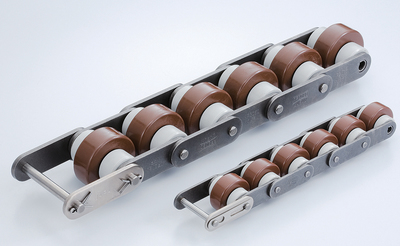Free flow conveyor reduces car plant downtime
A car manufacturing plant in France has almost completely eliminated the downtime caused by friction wear on conveyors thanks to the installation of Tsubaki Double Plus free flow chain. The robust rollers are resistant to wear, even when a high degree of friction is generated as the crates, which carry small parts through the factory, accumulate on the conveyor.

Visualising automotive production lines usually conjures up images of armies of robots lifting and manipulating huge car panels so that they can be welded. Of course this overlooks the myriad small parts that are equally essential to the construction of a car, and how they are accurately and efficiently transported around the plant.
Typically the parts are moved around in crates loaded onto conveyors. Thus a reliable crate transportation system is essential to the smooth running of the plant; and reliability is an absolute requirement in an industry where downtime can cost thousands of pounds/Euros an hour. In one French plant, conveyor reliability was becoming a problem, until Tsubaki provided a solution.
The plant had several conveyors running through the manufacturing area, but at various points, particularly the accumulation stations, the weight of the crates was causing friction, which in turn caused wear of the chain. The problem was getting steadily worse, with maintenance costs rising and downtime impacting on production efficiency. With growing levels of frustration, the car maker knew that a solution had to be found. Tsubaki was asked to inspect the site and suggest a solution that would deliver greater long term reliability as well as improved performance.
Tsubaki's engineers recommended their Double Plus chain, a unique design of chain that would allow crates to accumulate without significantly increasing the amount of friction being generated. Being a free flow design, the base chains keep running even while the crates are stationary in accumulation areas.
The Double Plus utilises a design based on two rollers of different diameters mounted on the chain pins. The larger central roller takes the weight of the crates, while the smaller outer roller supports the chain on a guide rail. When the rollers turn, the different diameters lead to different linear speeds at their circumferences. In fact the design is such that the larger roller's speed is 2.5 times that of the smaller one and thus the conveying speed of the crates is greater than the travelling speed of the chain beneath. This results in a substantial reduction in stress - and therefore wear and tear - on the power transmission system.
Double Plus free flow chains is available in five pitch diameters, 19mm, 25mm, 31mm, 38mm and 50mm. Different base chain material options, including steel, hardened chrome plated steel and stainless steel, are available as is Tsubaki's Lambda lube-free. These can be combined with different roller materials, such as engineering plastics, electro-conductive plastics and urethane lined plastics. The resultant vast range of specifications means chains can be matched to individual application requirements.
The car maker reports an immediate reduction in maintenance following the installation of the Double Plus chain. In addition the speed increase has helped to improve efficiency and noise during operation has been reduced. With wear and tear almost completely eliminated, longevity and reliability are expected to improve dramatically.
